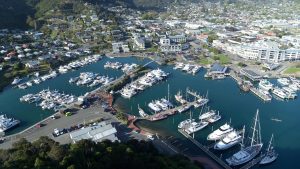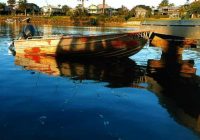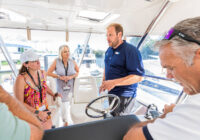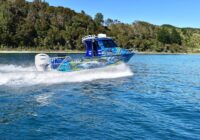The marina industry in Australia incorporates approximately 291 commercial marinas, yacht clubs and boatyards. It is an industry that supports one of Australia’s most iconic pastimes, boating. The industry is strong and has an exceptional record in participating in voluntary industry accreditation programs such as Clean Marinas and Gold Anchor that promote the maintenance of high standards, continuous improvement and demonstrate self-regulation.

While it is a mostly an industry of small business owners, the industry contributes over $2.2B to the economy annually, providing employment for well over 20,000 Australians and support for 11,000 other small businesses.
Nationally vessel storage occupancies are a very strong 86%, with NSW and Tasmania exceeding 90%.
In the 2023 Health of the Marina Industry Report, Dr Mahoney, researcher at Michigan State University Recreational Marine Research Centre commented, “there is a need for additional marina boat storage capacity, especially on-water storage spaces in many locations in Australia. A high percentage of marinas cannot accommodate additional boats and already have waiting lists for space that become open. An increasingly tight supply of on-water boat storage is likely to negatively impact boat sales, drive up the price of both on-water and on-land storage alternatives, and have a negative effect on the recreational boating industry in Australia.”
He went on to suggest that the industry Associations and local economic development agencies “encourage a more favourable climate for marina operation and development. This includes education residents and elected officials about the economic contribution of marinas including support of jobs and labour income. Additionally, there needs to e more information released concerning the environmental protection investments and efforts of marinas.”
For more data regarding the contributions and performance of the industry, refer to the 2023 Health of the Australian Marina Industry Survey.
Marinas provide the land/ water interface and infrastructure for people to access and enjoy Australia’s vast waterways and coastline. This includes boatowners, the general public and tourists.
- Marinas provide boatowners with a range of vessel storage options and water access points, relieving the reliance on public infrastructure such as mooring, boat ramps and jetties.
- Marinas often provide facilities and amenities that that enable those who don’t own boats to enjoy the waterways also (this may be through waterside food & beverage offerings, charter vessels, dinghy hire, sailing schools).
- Marinas play a critical role in facilitating one of Australia’s biggest exports, tourism. Marinas are required to for tourism activities such as snorkelling, fishing, diving, whale watching and ecotourism and many of these businesses are based on marina facilities.
Marinas provide boating infrastructure.
- Marinas in Australia provide storage for over 50,000 vessels including over 35,000 on water spaces (berths and moorings) and over 10,000 on land (dry stacks and hardstands).
- The average marina in Australia provides 182 vessel storage spaces.
- Marinas provide environmentally responsible maintenance facilities for recreational and commercial vessels.
- 50% of marinas provide fuel services.
- 54% of marinas provide black & grey water disposal facilities and services.
Marinas are environmental champions. They are important in setting responsible standards and monitoring behaviour.
- Over 60 marinas voluntarily accredit as Clean Marina and Fish Friendly marinas. These marinas submit to an assessment of their facility by a qualified environmental auditor every three years.
- Marinas play an important role in promoting a strong culture of proactive environmental care. They monitor compliance and set rules and policies. 69% of marinas invest in environmental protection strategies.
- Marinas assist in educating boaters with respect to marine pests and bio security risks.
- Fish Friendly marinas incorporate infrastructure and policies in their marinas that promote healthy, thriving fish habitats.
Marinas provide employment opportunities. Marinas create local jobs. Marinas support other marine businesses.
- Marinas directly employ over 3,300 people and pay wages of $160M annually.
- The average marina in Australia directly employs 14 staff, yet many more jobs are generated by the tenant businesses that operate from the marina, with a further 11,000 small business tenants working at marina located businesses. Including contractors and non-marina based businesses, marinas generate over 21,000 Australian jobs.
- Many jobs are regional and local.
Marinas support small businesses.
- Marinas are mostly independently owned and operated small businesses.
- Marinas provide support to over 2,600 small businesses by providing them with premises to work from and a customer base, with almost 60% providing such premises.
- Marinas on average have nine business based on their sites.
Marinas are important economic contributors.
- Marinas contribute over $2.24B to the economy.
- The average marina turnover is $2.7M.
- The average marina contributes 16% of its revenues back to governments through lease payments and taxes.
Marinas have a positive impact on mental health.
- Boating and on water recreation is proven to promote better mental health outcomes.
- Marine activities are often used in rehabilitation.
- Many marinas and clubs support not for profit groups that provide such services such as Sailability, On Water Veterans and Soldier On.
About the Marina Industries Association (MIA)
The MIA is the peak body representing the interests of club, recreational and commercial marinas, boatyards and industry suppliers in Australia & the wider Asia-Pacific region. Working closely with other marina associations around the world, the MIA works in support of developing sustainable marina industries through the delivery of strong leadership, industry guidance, education, accreditation and research. The MIA has over 340 corporate members and connects over 2,000 industry leaders and decision makers. 75% of members are marinas, clubs and boatyards and over 80% of larger marinas (over 100 berths) in Australia are members of the MIA.
Health of the Marina Industry Survey
The main body of research conducted by the MIA is the Health of the Australian Marina Industry Study (HAMIS). Funded by the MIA and International Marina Consultants, HAMIS is a biennial survey which began in 2008 and provides high quality, reliable data to quantify the size, value and benefits of the marina industry in Australia. HAMIS is arguably the most comprehensive industry survey conducted in the marine industry sector. It aggregates industry data to provide valuable performance benchmarks and values the economic contribution of the industry as well as the social and environmental benefits of marinas. The survey attains a response rate of over 40% of all marinas in the country, thus producing highly reliable statistics beneficial to decision makers from marinas, boatyards, governments and developers.
The survey sponsor, International Marina Consultants is a leader in the industry, providing special services for the planning, design and feasibility of marinas and associated waterfront facilities.
In 2023 the survey was expanded to include New Zealand Marinas. The results of the 2023 survey were presented at the Marinas24 International Conference & Trade Exhibition on 27 May 2024. Summary data can be accessed here and the full report is available to purchase from the MIA.
International Clean Marina & Fish Friendly
Clean Marina is an international, voluntary accreditation for marinas, boatyards, and associated industry operators. The goal of Clean Marinas is to reduce ‘non-point source pollution’, protect and enhance inland and coastal waterways improve air quality, and create thriving, sustainable marina businesses.
Clean Marinas assists in educating operators with respect to environmental compliance and to develop robust best management practices by leading them through an easy-to-follow independently assessed accreditation process of over 60 criteria across all aspects of the marina’s operation including compliance, facility management, emergency preparedness and boater education.
Fish Friendly is an accreditation available to all certified Clean Marinas and has been developed to inform marina managers on ways to promote beneficial fish habitats.
There are 60 accredited Clean Marinas and 35 Fish Friendly marinas in the region. These programs continue to grow as marinas realize the risk management benefits and goodwill it generates with stakeholders. In 2021, The Yacht Harbour Association (TYHA) adopted the program and is rolling it out in the UK and Europe.
Global Gold Anchor
Gold Anchor is an international accreditation and rating program which indicates the level of services and facilities provided by a marina. The accreditation benchmarks 86 criteria across all areas of the business including service, the provision of on-and-off-water facilities, and management practices. The rated assessment option provides a professional and independent evaluation of the operation and incorporates an externally conducted customer survey.
The accreditation process provides significant business benefits including the establishment of benchmarks, standards and improvement pathways. It serves as a useful tool to share with insurers, regulators and other stakeholders to demonstrate levels of compliance and operational management.
The international program has accredited over 220 marinas across 27 countries and is a joint venture initiative between the Marina Industries Association (MIA) and The Yacht Harbour Association (TYHA). TYHA delivers the Program in the United Kingdom, Europe, Middle East, Africa and the Caribbean. The MIA delivers the accreditation in Australia, Asia-Pacific and in the USA in association with the Marine Recreation Association (MRA). A complete listing of all Gold Anchor marinas can be found at www.globalgoldanchor.com.
From the office of the Marina Industries Association (MIA)







